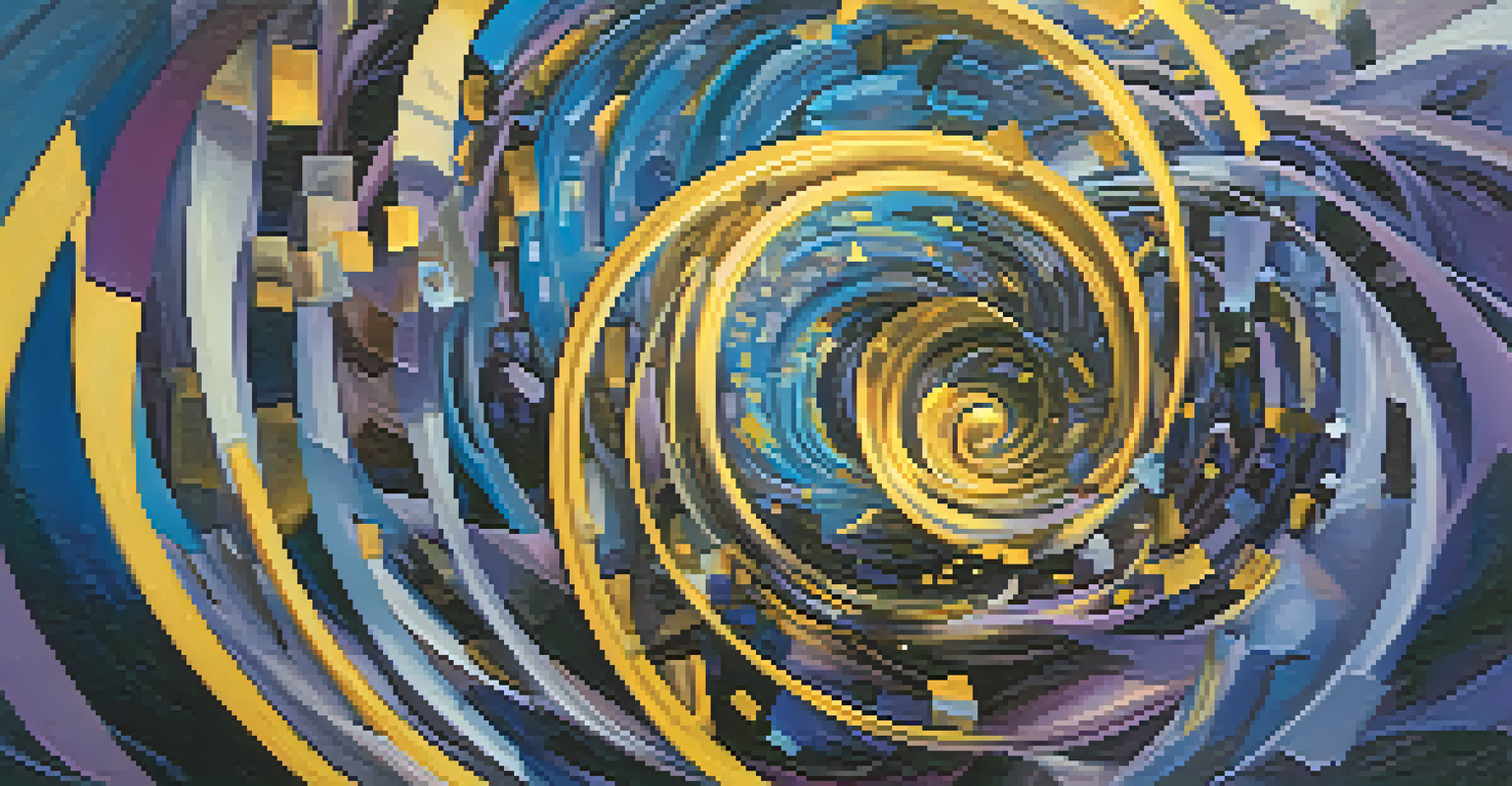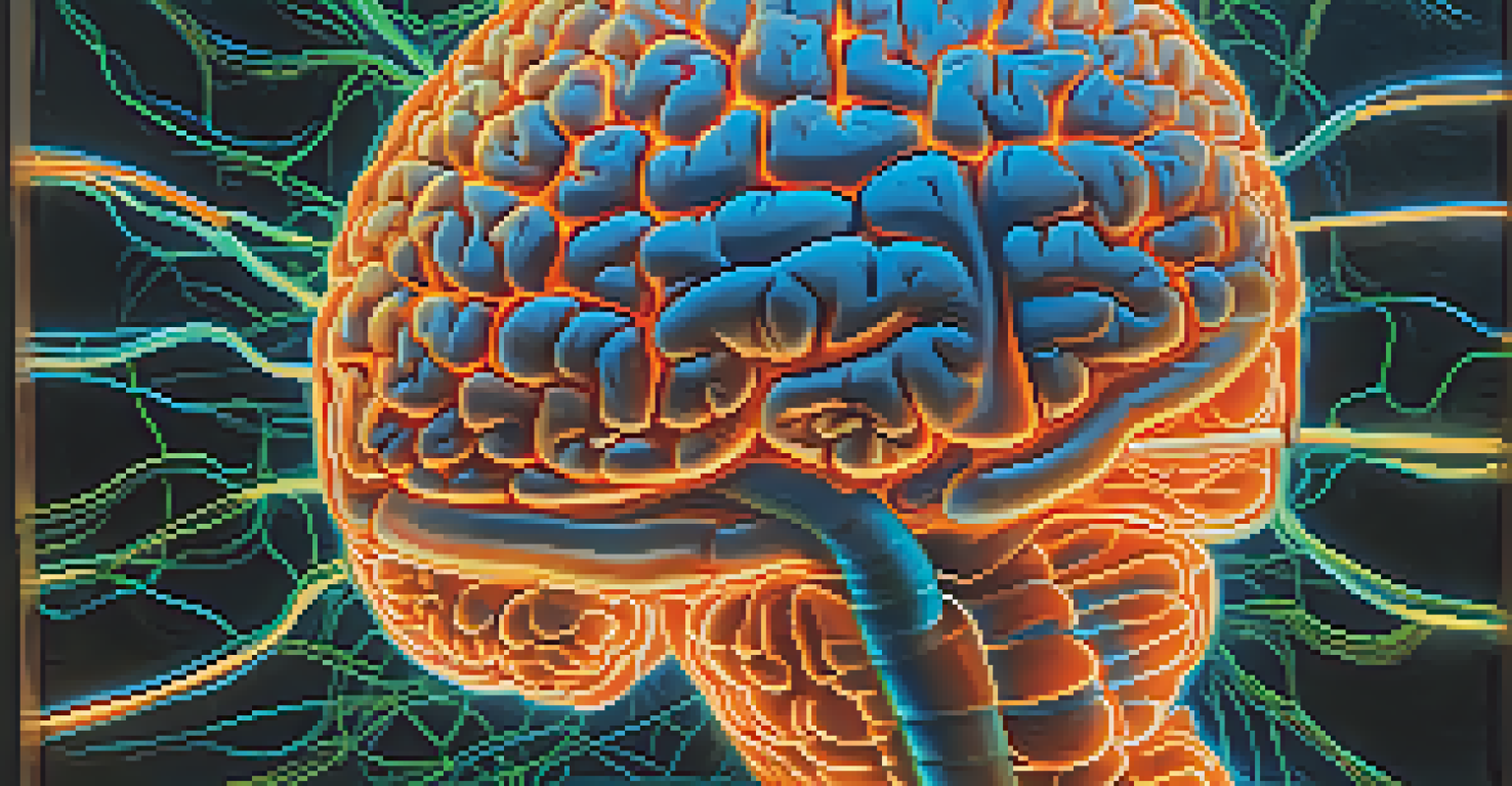Memory Recall and Hallucinogens: A Psychological Perspective

Understanding Memory Recall and Its Mechanisms
Memory recall is the process of retrieving information stored in our brains. It’s like searching for a file on your computer; sometimes you find it quickly, and other times, it feels lost in the depths of your digital storage. This retrieval can be influenced by various factors, including emotions, context, and even substance use.
Memory is the treasure house of the mind wherein the monuments thereof are kept and preserved.
The brain has different types of memory, such as short-term and long-term memory, each playing a role in how we remember experiences. Short-term memory works like a notepad, holding information temporarily, while long-term memory acts like a library, storing valuable knowledge and experiences for future use. Understanding these mechanisms gives insight into how hallucinogens might alter our perception of memory.
When we think about memory recall, it’s essential to consider how external influences, such as drugs, can affect this process. Hallucinogens, for example, may disrupt the typical pathways our brains use to retrieve memories, leading to altered experiences. This interplay between memory and substance use opens up a fascinating area of psychological research.
The Role of Hallucinogens in Memory Processing
Hallucinogens are substances that can significantly alter a person’s perception, mood, and cognitive processes. Common examples include LSD, psilocybin (found in magic mushrooms), and mescaline. These substances can create vivid hallucinations, altering how users perceive reality, which may also affect their memory processing.

When someone takes a hallucinogen, the brain undergoes a unique transformation, often leading to increased emotional experiences and altered thought patterns. In this heightened state, the brain may form new connections and associations, which can impact how memories are created and recalled later on. It’s like taking a different route through a familiar neighborhood; you might discover new landmarks along the way.
Memory Recall is Complex
The process of memory recall is influenced by various factors, including emotions and substance use, which can alter how we retrieve information.
Research suggests that hallucinogens can enhance creativity and lead to novel insights, potentially reshaping personal memories in the process. However, this can also result in distortions or confusions regarding past events, making it challenging to differentiate between reality and hallucination. Understanding these effects is crucial for grasping how our memories can be flexible and sometimes unreliable.
Psychological Effects of Hallucinogens on Memory
The psychological impact of hallucinogens on memory recall can vary widely among individuals. For some, these substances may unlock deeply buried memories or emotions, creating a therapeutic effect. For others, the experience can be overwhelming, leading to confusion and difficulty recalling specific events.
The greatest discovery of my generation is that a human being can alter his life by altering his attitudes.
One notable phenomenon is the 'flashback,' where individuals may suddenly relive aspects of their hallucinogenic experience days or even months later. This can blur the lines between past and present, creating a unique challenge for memory recall. Imagine trying to remember a movie scene but finding it intermingled with your own life experiences—this is often how hallucinogens affect memory.
Additionally, the emotional state induced by hallucinogens can enhance or impair memory recall. Positive emotions may lead to clearer recollections, while negative feelings can cloud the memory process. This intricate relationship between emotion, memory, and hallucinogens reveals the complexity of human psychology.
The Science Behind Hallucinogens and Memory Recall
At the heart of the interaction between hallucinogens and memory recall is neurotransmission, particularly involving serotonin and dopamine pathways. These chemicals help regulate mood, cognition, and perception. When hallucinogens are introduced, they can disrupt normal neurotransmitter activity, leading to altered cognitive functions, including memory recall.
Research has shown that hallucinogens can increase synaptic plasticity—the brain’s ability to adapt and change—potentially leading to enhanced memory formation. This is akin to how a sculptor reshapes clay, allowing for new forms and structures to emerge from basic material. However, this increased plasticity can also lead to memory distortions and inaccuracies.
Hallucinogens Alter Memory Processing
Hallucinogens can change how memories are formed and recalled, sometimes enhancing creativity but also leading to distortions.
Understanding the biochemical processes involved helps demystify the psychological effects of hallucinogens on memory. By examining how these substances interact with brain chemistry, researchers can gain insights into not just memory recall but also the broader implications for therapy and mental health.
Therapeutic Uses of Hallucinogens for Memory Disorders
Emerging research is exploring the therapeutic potential of hallucinogens in treating memory-related disorders, such as PTSD and depression. These substances may help patients confront and process traumatic memories, leading to healing and improved mental health. It's an approach that flips traditional therapy on its head, inviting patients to experience their memories in a new light.
For instance, studies have shown that psilocybin can reduce anxiety and depression in terminally ill patients, allowing them to recall and reframe their life experiences. This therapeutic journey can be likened to a guided tour through one’s memory, where the guide helps navigate difficult terrain while highlighting moments of beauty and clarity.
While these therapeutic applications show promise, they also raise important ethical and safety considerations. Proper guidance and controlled environments are essential to ensure that the experiences are constructive and do not lead to further psychological distress. Balancing hope and caution is vital in this evolving field of research.
Limitations and Risks of Hallucinogens on Memory Recall
Despite the potential benefits, using hallucinogens carries inherent risks, particularly concerning memory recall. Not everyone responds positively to these substances, and adverse reactions can include confusion, anxiety, and even psychosis. This unpredictability can complicate the therapeutic use of hallucinogens, making it crucial to approach this area with care.
Additionally, the subjective nature of hallucinogen experiences can lead to unreliable memory recall. Individuals might struggle to differentiate between what actually happened and what they perceived during their trip. This can create challenges in both therapeutic settings and personal reflections, much like trying to remember a dream that fades upon waking.
Therapeutic Potential and Risks
While hallucinogens show promise in treating memory-related disorders, they come with risks that can complicate therapeutic outcomes.
Furthermore, the long-term effects of hallucinogens on memory remain an area of ongoing research. While some studies indicate potential benefits, others highlight the possibility of lasting impairments. Understanding these risks is essential for anyone considering the use of hallucinogens, whether for therapy or personal exploration.
Future Directions in Research on Memory and Hallucinogens
As interest in the therapeutic use of hallucinogens grows, so does the need for comprehensive research to better understand their effects on memory recall. Future studies may focus on identifying specific populations that could benefit from these substances, as well as the optimal dosages and therapeutic settings. This could pave the way for more effective treatments for memory-related disorders.
Moreover, advancements in neuroimaging technology could provide deeper insights into how hallucinogens affect brain function and memory processes. By observing changes in brain activity during hallucinations, researchers can begin to map the complex interactions between memory, emotion, and perception. It’s like peering into the engine of a car to understand how different parts work together.

Ultimately, the future of research on memory and hallucinogens holds exciting possibilities. As we continue to explore the intricate relationship between these substances and memory recall, we may uncover new therapeutic avenues that could transform mental health treatment and enhance our understanding of human cognition.